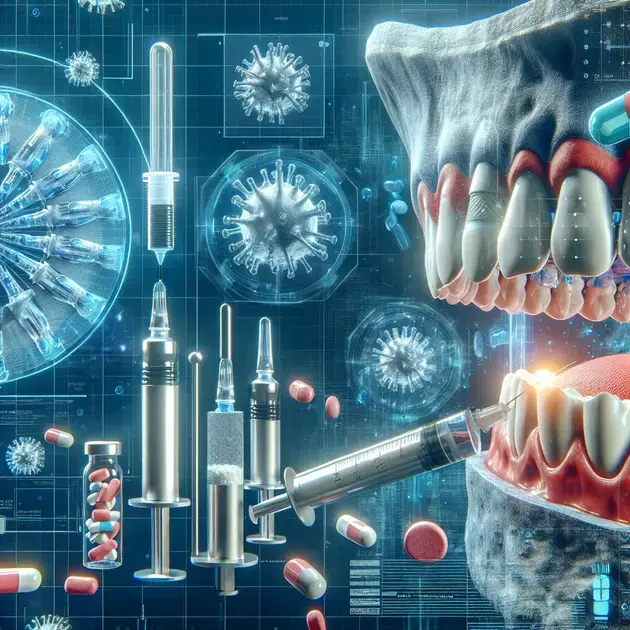When it comes to treating periodontitis, finding an effective medication is crucial for successful outcomes. In recent studies, the focus has been on developing new medications that can target the root cause of the disease, providing patients with more advanced treatment options.
Effective medication for periodontitis treatment not only helps in managing the symptoms but also aids in slowing down the progression of the disease. With advancements in the field of periodontics, patients now have access to a variety of medications that are specifically designed to combat the bacteria responsible for periodontitis, promoting better oral health.

Effective Medication for Periodontitis Treatment: The Key to Successful Outcomes
When considering effective medication for periodontitis treatment, it’s important to understand that this condition requires a comprehensive approach. One key aspect is the use of antibiotics to target the bacteria causing the infection. An example of a widely used antibiotic for periodontitis is doxycycline, which helps reduce inflammation and combat bacterial growth.
Another crucial element in successful outcomes is the use of antimicrobial mouth rinses. Chlorhexidine mouthwash is a common choice as it can help reduce bacteria in the mouth and promote healing of the gums. Using these mouth rinses as directed can significantly improve treatment results.
In addition to antibiotics and mouth rinses, oral hygiene practices play a vital role. Regular brushing, flossing, and dental cleanings are essential for managing periodontitis. Consider using an electric toothbrush, which can be more effective in removing plaque buildup. Websites like Colgate or Oral-B provide detailed instructions on proper oral care techniques.
Furthermore, seeking professional dental care is paramount for successful treatment. Periodontists specialize in treating gum diseases and can provide personalized treatment plans tailored to individual needs. Websites like the American Academy of Periodontology can help locate qualified periodontists in your area.
Overall, the key to successful outcomes in treating periodontitis lies in a combination of effective medications, proper oral hygiene practices, and professional dental care.
Developing Advanced Medications for Periodontitis: A Focus on Targeting the Root Cause
In the quest for developing advanced medications for periodontitis, researchers are focusing on targeting the root cause of the condition. One promising approach is the use of targeted drug delivery systems that can deliver medications directly to the affected areas in the gums. Sites like PubMed offer comprehensive research articles on this innovative drug delivery method.
Another area of development is the use of probiotics to promote a healthy balance of oral bacteria. Probiotic supplements or foods containing beneficial bacteria can help restore oral microbiota balance and support gum health. Websites like Healthline provide insights into the benefits of probiotics for oral health.
Besides traditional medications, there is a growing interest in natural remedies for periodontitis. Essential oils such as tea tree oil and peppermint oil have shown antimicrobial properties that can aid in treating gum infections. Learning how to use essential oils safely can be found on websites like Medical News Today.
Collaboration between pharmaceutical companies, researchers, and dental professionals is key to advancing the development of effective medications for periodontitis. Stay informed about the latest advancements in periodontal treatment through reputable sources like the Journal of Clinical Periodontology.
By targeting the root cause of periodontitis and exploring innovative treatment approaches, the development of advanced medications holds great promise for improving outcomes in managing this common oral health issue.
Promoting Better Oral Health: The Role of Specialized Medications
Specialized medications play a crucial role in promoting better oral health, especially in the treatment of complex conditions like periodontitis. One important aspect is the use of prescription-strength mouthwashes that contain specific ingredients to target bacteria and inflammation. Consulting with a dentist or periodontist can help determine the right medication for individual needs.
For patients undergoing advanced periodontal treatments, locally applied medications such as gels or chips may be recommended. These localized delivery systems can provide targeted therapy to the affected areas and enhance treatment outcomes. Information on these medications can be found on websites like WebMD.
In cases where systemic medications are necessary, such as antibiotics or anti-inflammatory drugs, close monitoring and adherence to prescribed regimens are essential. Understanding the potential side effects and interactions of these medications is crucial for maintaining overall health. Websites like Mayo Clinic offer valuable resources on medication safety.
Alongside specialized medications, incorporating a well-rounded oral care routine is fundamental for promoting better oral health. This includes regular dental check-ups, proper brushing and flossing techniques, and a balanced diet. Websites like the American Dental Association provide guidance on maintaining optimal oral hygiene.
By recognizing the role of specialized medications in oral health and combining them with comprehensive dental care practices, individuals can effectively manage conditions like periodontitis and achieve better overall oral health outcomes.

**Developing Targeted Therapies for Periodontitis: A Precision Approach to Treatment**
In the field of periodontal care, there is a growing emphasis on developing targeted therapies for treating periodontitis. By utilizing a precision approach to treatment, healthcare providers can customize interventions based on individual patient characteristics, such as the severity of the disease, medical history, and genetic factors. This personalized approach aims to optimize treatment outcomes and improve patient satisfaction.
One key aspect of developing targeted therapies for periodontitis is the use of advanced diagnostic tools, such as genetic testing and microbiome analysis. By gaining insights into the specific bacteria present in a patient’s oral cavity and their genetic predisposition to periodontal disease, healthcare providers can tailor treatment plans to target the root cause of the condition. This precision medicine approach allows for more effective and efficient treatment strategies.
Furthermore, targeted therapies for periodontitis often involve the use of novel drug delivery systems, such as locally applied antibiotics or antimicrobial agents. These targeted interventions can help reduce the need for systemic medications and minimize side effects, leading to better compliance and treatment outcomes. By precisely delivering medications to the affected areas, healthcare providers can enhance the efficacy of treatment while minimizing risks.
Overall, developing targeted therapies for periodontitis represents a shift towards personalized medicine in dental care. By combining advanced diagnostics, tailored treatment plans, and innovative drug delivery systems, healthcare providers can offer patients more effective and efficient solutions for managing periodontal disease. This precision approach to treatment holds great promise for improving outcomes and transforming the landscape of periodontal care.
Enhancing Periodontal Care with Personalized Medication Plans
Personalized medication plans play a crucial role in enhancing periodontal care and optimizing treatment outcomes for patients with periodontitis. By tailoring medication regimens to each individual’s specific needs and characteristics, healthcare providers can address the root causes of the disease more effectively and improve overall oral health. This personalized approach involves identifying the most appropriate medications, dosages, and administration routes based on factors such as disease severity, medical history, and treatment response.
When developing personalized medication plans for periodontitis, healthcare providers may consider a combination of systemic and locally applied medications. Systemic antibiotics or antimicrobial agents may be prescribed to target bacteria throughout the body, while locally applied medications, such as gels or mouthwashes, can directly address the bacteria present in the oral cavity. By combining these approaches, healthcare providers can achieve a comprehensive and targeted treatment strategy.
In addition to traditional medications, personalized medication plans for periodontal care may also incorporate alternative therapies, such as probiotics or anti-inflammatory agents. These complementary treatments can help restore the balance of oral microbiota, reduce inflammation, and support overall gum health. By customizing medication plans to include a range of therapeutic options, healthcare providers can offer patients a holistic approach to managing periodontitis.
Overall, enhancing periodontal care with personalized medication plans involves a comprehensive and individualized approach to treatment. By tailoring medications to each patient’s unique needs and utilizing a combination of systemic and local interventions, healthcare providers can optimize treatment outcomes and improve the long-term management of periodontal disease. This personalized medicine approach holds great promise for transforming the way periodontitis is treated and managed.
Innovative Drug Delivery Systems for Optimal Periodontitis Management
In the quest for optimal periodontitis management, innovative drug delivery systems have emerged as a promising solution for enhancing treatment outcomes and patient satisfaction. These advanced systems leverage cutting-edge technology to precisely deliver medications to the affected areas, ensuring targeted and effective treatment of the disease. By incorporating innovative drug delivery systems into periodontal care, healthcare providers can overcome traditional challenges associated with medication administration and improve the efficacy of treatment.
One key advantage of innovative drug delivery systems is their ability to overcome barriers to conventional medication delivery in the oral cavity. For example, sustained-release drug delivery systems can provide a controlled release of medications over an extended period, ensuring continuous therapeutic effects and reducing the need for frequent dosing. This targeted delivery approach enhances treatment compliance and minimizes fluctuations in drug concentrations, leading to improved outcomes for patients with periodontitis.
Furthermore, innovative drug delivery systems offer the potential for localized and site-specific treatment of periodontal disease. By encapsulating medications in biocompatible materials or utilizing specialized devices, healthcare providers can precisely target the affected areas of the gums and oral tissues. This targeted approach allows for higher concentrations of medications at the site of infection, improving therapeutic efficacy and reducing the risk of systemic side effects.
Overall, innovative drug delivery systems represent a transformative approach to optimizing periodontitis management and enhancing patient care. By harnessing the power of advanced technology and precision medicine, healthcare providers can deliver tailored and effective treatments that address the unique needs of each patient. These innovative systems have the potential to revolutionize the way periodontal disease is treated, offering new avenues for improving outcomes and quality of life for individuals affected by this common oral health condition.
**
Conclusion
**
In conclusion, the development of targeted therapies for periodontitis represents a significant advancement in dental care, shifting towards a personalized medicine approach. By utilizing precision treatment strategies tailored to individual patient characteristics, such as disease severity and genetic factors, healthcare providers can optimize treatment outcomes and enhance patient satisfaction. Advanced diagnostic tools like genetic testing and microbiome analysis provide valuable insights into the root causes of periodontal disease, enabling targeted interventions for more effective treatment.
Personalized medication plans play a crucial role in enhancing periodontal care by addressing the specific needs of each patient. By customizing medication regimens based on factors like disease severity and treatment response, healthcare providers can effectively target the underlying causes of periodontitis and improve overall oral health. The incorporation of alternative therapies, in addition to traditional medications, offers a holistic approach to managing periodontitis, supporting the restoration of oral microbiota balance and reducing inflammation.
Innovative drug delivery systems have emerged as a promising solution for optimizing periodontitis management. By precisely delivering medications to the affected areas using advanced technology, healthcare providers can overcome challenges associated with conventional medication administration and improve treatment efficacy. These systems enable site-specific treatment of periodontal disease, offering higher concentrations of medications at the infection site while minimizing systemic side effects, ultimately revolutionizing the way periodontitis is treated and enhancing patient care.



